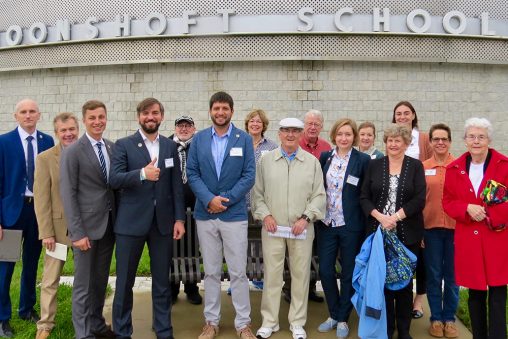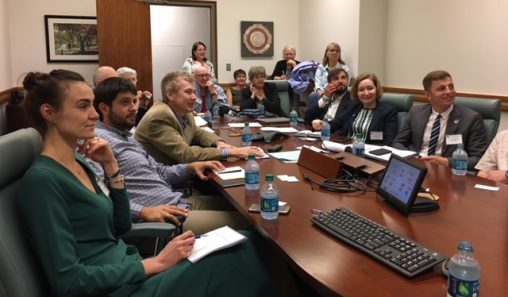
The Wright State University Boonshoft School of Medicine hosted a group of health care practitioners from Ukraine on Sept. 10. Their visit focused on how technology can be used to improve health care.
The Wright State University Boonshoft School of Medicine hosted a group of health care practitioners from Ukraine on Sept. 10. Their visit focused on how technology can be used to improve health care.
The group was in Dayton as part of the Open World Leadership Program, a U.S. exchange program with post-communist countries. Open World asked Friendship Force of Dayton, a nonprofit organization devoted to promoting peace, to coordinate and host the Ukrainian health care practitioners. Their trip to Dayton was focused on health care innovations.
“Three of the young Ukrainian leaders are involved in successful startup businesses that enhance the delivery of health care,” said Julie Vann, president of the Friendship Force of Dayton. “Another delegate has been involved in national policy discussions in Ukraine about drugs, and another is an accomplished physician. This visit was a great opportunity to learn what others are doing to improve healthcare delivery.”
It was the second trip in which the Boonshoft School of Medicine assisted Friendship Force of Dayton. In the spring of 2017, health care providers from Tajikistan visited the medical school to learn more about mental health and developmental disability diagnosis and issues.
Randy Welton, M.D., associate professor of psychiatry and director of the Boonshoft School of Medicine Psychiatry Residency Training Program, has been instrumental in organizing these visits at the Boonshoft School of Medicine.
“For the Boonshoft School of Medicine Department of Psychiatry, these visits have been a way to educate a broader audience and establish collective networks within Dayton and with an international medical community,” Welton said.
During the visit, the Ukrainian health care practitioners visited the Wright State University & Premier Health Neuroscience Institute at the Neuroscience Engineering Collaboration Building. They toured the facility and discussed ongoing projects at the Neuroscience Institute.
Their second stop was at the Kno.e.sis Center, the Ohio Center of Excellence in Knowledge-Enabled Computing at Wright State. They learned about an asthma chatbot, an interactive program that helps patients manage asthma. The program automatically monitors weather, pollen counts, activity levels and oxygen levels. It advises patients on the use of medication.

The group of health care practitioners from Ukraine visited several departments at the Boonshoft School of Medicine.
At the Boonshoft School of Medicine, the visitors toured the medical school’s Skills Assessment and Training Center in White Hall to learn about standardized patients, individuals who are specifically trained to portray various patients and cases. These standardized patients provide a real-life component for the training of medical students.
The Ukrainian physicians also were introduced to the use of telemedicine at the Boonshoft School of Medicine’s Department of Psychiatry. Through telemedicine, psychiatrists can reach patients in rural areas and those who have limited access to care and can provide a range of services, including psychiatric evaluations, therapy, education and medication management.
Their visit to the Boonshoft School of Medicine ended with a session about trends in psychiatry with Welton and psychiatry residents. Throughout the week, the group visited other health care organizations in the Dayton area.

 Wright State to expand nursing facilities to meet workforce needs and prepare more graduates for in-demand careers
Wright State to expand nursing facilities to meet workforce needs and prepare more graduates for in-demand careers  Wright State student-athletes make a lasting impact on local family with more to come
Wright State student-athletes make a lasting impact on local family with more to come  Wright State names Rajneesh Suri dean of Raj Soin College of Business
Wright State names Rajneesh Suri dean of Raj Soin College of Business  ‘Only in New York,’ born at Wright State
‘Only in New York,’ born at Wright State  Wright State president, Horizon League leaders welcome new commissioner
Wright State president, Horizon League leaders welcome new commissioner 